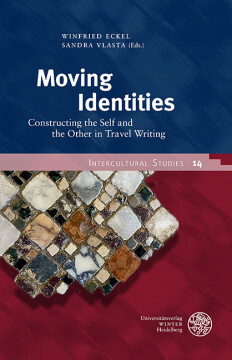
BUCH
Moving Identities
Constructing the Self and the Other in Travel Writing
Herausgeber: Eckel, Winfried | Vlasta, Sandra
Intercultural Studies, Bd. 14
2025
Zusätzliche Informationen
Bibliografische Daten
Abstract
‘Moving Identities’: The Title of this volume refers to the many ways in which travel writing relates the concepts of travel and identity. Its most important meanings are (1) the reflexive-dynamic meaning, (2) the transitive-dynamic meaning, and (3) the paradoxical-static meaning. All three denote different ways of linking the identities of self and Other with the movement of the journey and of staging them textually, i.e. not simply representing them as if they also existed independently and outside of the texts but presenting and performing them by means of their rhetoric. The reflexive-dynamic and the transitive-dynamic meanings coincide in that they exclude, in principle, the essentialist idea of an unchanging identity as sameness over time and/or across persons. The paradoxical-static meaning, on the other hand, corresponds to the fact that essentialist positions are nevertheless asserted in some of the analysed travelogues. This volume includes contributions on travel writing in English, French, German, Polish and Spanish from the 18th to the 21st century.
Inhaltsverzeichnis
| Zwischenüberschrift | Seite | Aktion | Preis |
|---|---|---|---|
| Cover | Cover | ||
| Title | 3 | ||
| Imprint | 4 | ||
| Contents | 5 | ||
| Preface: Tim Youngs | 7 | ||
| Introduction: Winfried Eckel, Sandra Vlasta | 9 | ||
| Who Travels, Who Writes? On the Malleability of Identities and Borders: Stacy Burton | 23 | ||
| Imperial Englishness: English Travel Writing on Scotland and Narratives of National Identity in 18th-Century Britain: Matthias Lehmann | 41 | ||
| Intertextuality in Travel Writing: Shaping Identity through Textual Relations in Travelogues by Karl Philipp Moritz and Mary Shelley: Sandra Vlasta | 61 | ||
| The Role of the Travellee-Translator in the Construction of National Identity: Elizabeth (Rigby) Eastlake’s 1836 Translation of Johann David Passavant’s ‚Kunstreise durch England und Belgien‘: Alison E. Martin | 79 | ||
| Shaping the Speaker? Voices in Polish Romantic Travel Writing: Anja Burghardt | 93 | ||
| Androgynous Forms: Gender Identity on the Move in Amelia Edwards’s Travel Writing (1856–1877): Rebecca Butler | 113 | ||
| Into the ‘Hermit Kingdom’: Spatial Constructions of Identity and Alterity in Isabella Bird’s ‚Korea and Her Neighbours’: Franziska Jekel-Twittmann | 133 | ||
| “Il y a encore une mer à traverser”: Moving Identity in Aimé Césaire’s Cahier ‚d’un retour au pays natal‘: Winfried Eckel | 155 | ||
| Creating a Sense of Pan-American Connectedness: Gabriela Mistral’s Travel Writing on Brazil: Marília Jöhnk | 171 | ||
| “Nothing was created in the West Indies”: The Absence of Caribbean Identity in V.S. Naipaul’s Travelogue ‚The Middle Passage‘: Martina Kopf | 187 | ||
| Im/mobilities in Contemporary German Cycling Travel Reports: Anselm Nathanael Pahnke’s Anderswo. Allein in Afrika (2018): Birgit Englert | 203 | ||
| Francophone Travel Narratives in the Twentieth Century and the Question of Otherness: Jean-Xavier Ridon | 227 | ||
| Contributors | 241 | ||
| Backcover | Backcover |


 Publishing Platform by CloudPublish
Publishing Platform by CloudPublish